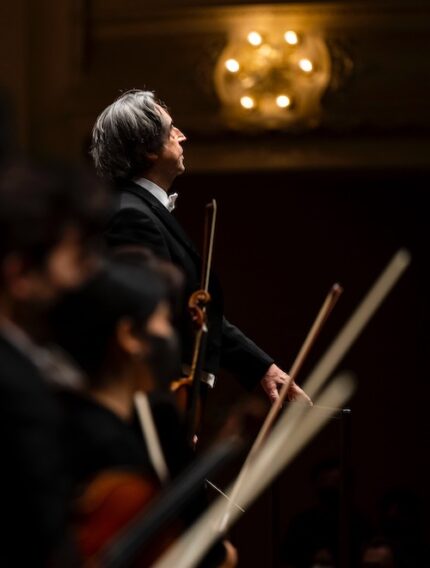The Riccardo Muti era at CSO: First-class hires, memorable opera nights, and bland, repetitive programs
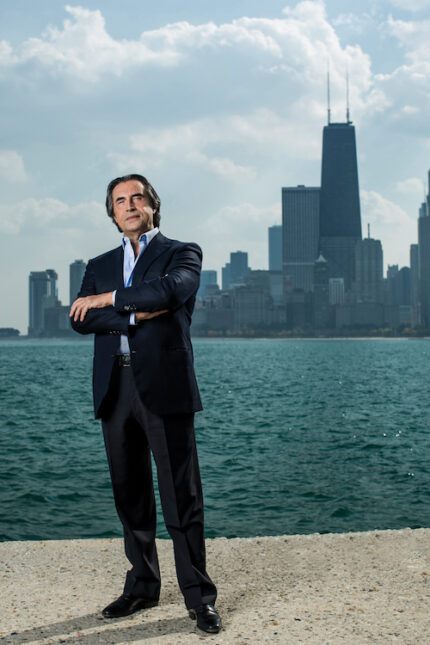
At 3 p.m. on Sunday, June 25, Riccardo Muti will give the downbeat for Beethoven’s Missa solemnis, a performance that will mark his final concert as music director of the Chicago Symphony Orchestra. (A free “Concert for Chicago” at Grant Park two days later will be the al fresco coda.)
When the celebrated Italian conductor took the reins of the CSO in 2010, there was great excitement and anticipation from musicians and audiences alike. 30,000 people packed Millennium Park for a concert of populist works.
In his debut season (2010-11) Muti was bedeviled by a series of health issues—withdrawing from a gala concert with Anne-Sophie Mutter minutes before the curtain, cancelling several events, returning to Italy due to “extreme exhaustion,” and then—upon his return—passing out during a rehearsal, falling and fracturing his jaw. Installing a pacemaker appeared to solve the medical problems, and Muti has remained healthy and an impressively vigorous and energetic podium presence into his 80’s.
As superb an ensemble as the CSO was when Muti came on the scene, there is no doubt that he has taken the orchestra to an even higher level. A demanding taskmaster, Muti’s insistence on accurate intonation, meticulous balancing and scrupulous fidelity to the score have all raised the qualitative level of the CSO—as well as raising expectations for local audiences.
Muti’s performances throughout most of his Chicago tenure have been consistently inspired—certainly more so than under his wildly uneven predecessor, Daniel Barenboim.
Over the past 13 seasons—interrupted by the pandemic in 2020-21—Muti’s CSO concerts have offered a discerning blend of textual fidelity and immaculate polish with consistent fire and theatrical excitement. Among the highlights early on were a balletic Bruckner Sixth Symphony, a barn-burning Beethoven Fifth, and an affecting performance of Shostakovich’s Suite on Verses of Michelangelo.
Performances of central repertoire by Mozart, Beethoven, Schubert, Brahms, Tchaikovsky, and Prokofiev were invariably first-rate—polished to a refined sheen with crackling excitement.
Muti largely neglected Haydn, Wagner and French repertoire, Berlioz apart. He remained wary of Mahler—oddly so as leader of a celebrated Mahler ensemble—limiting his outings to the First and Fourth symphonies and the Rückert-Lieder.
While truly memorable concerts have been less frequent in recent years, there have still been great nights: a riveting performance of William Schuman’s Symphony No. 9 (“Le fosse Ardeatine”) a rousing Philip Glass Eleventh Symphony and, especially, a revelatory Beethoven “Eroica,” which cries out to be released on CSO Resound, the orchestra’s house label.
But, unsurprisingly, Muti’s finest and most consistent achievements have come with concert performances of Italian opera, especially those by his beloved Verdi. Beginning with Otello in 2011, he has led well cast, world-class performances of Macbeth, Falstaff, Aida, Un ballo in maschera, a blistering bicentennial performance of the Manzoni Requiem, and Mascagni’s Cavalleria Rusticana. In this repertoire, Muti drew a remarkable range of colors, a striking degree of expressive depth and a thrilling theatrical intensity, which had one marveling anew at Verdi’s mastery. (Some of these live performances have been released on Resound.)
__________
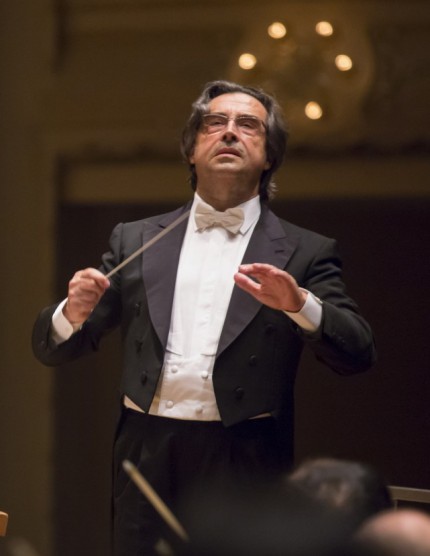
There have also been disappointments over the past 13 years, and none greater than Muti’s bland and repetitive programming.
For a music director that began his tenure with Berlioz’s oddball Lelio, one anticipated that Muti would be surveying a range of rarities and unusual repertoire in Chicago.
That never happened. Muti’s fitful excursions into rarely performed works by Italian and other composers ebbed after a few seasons. Contemporary music was largely restricted to conducting a single annual premiere by the CSO’s composer in residence. Guest conductors were often tasked with important local or U.S. premieres.
The most notable failure of Muti’s tenure leading this top American orchestra has been his lack of interest in exploring the vast array of excellent, neglected American music of the past. He waited nine years into his tenure before conducting an American symphony (the aforementioned Schuman) and one can count the number of homegrown symphonies Muti has conducted over 13 years on one hand and still have fingers left over. He never conducted a note of unjustly overlooked composers like David Diamond, Walter Piston or Paul Creston. (Someone should have informed him that Piston’s family name was Pistone and that Creston was born Giuseppe Guttoveggio.) The exhilarating results he obtained in isolated events like the Schuman and Glass concerts make it even more frustrating that Muti showed such little interest in being more of an advocate for American music.
Instead, Chicago audiences repeatedly got self-referential Italian (and “Italian”) rep, many of dubious musical interest and quality, like the Respighi tone poems, Strauss’s Aus italien and Bizet’s numbing Roma.
One problem is that conductors in Chicago are invariably allowed to stay on the job too long—whether their tenure has been successful or not. Muti’s term was extended a year due to the pandemic, but the partnership with the orchestra started losing artistic steam around the decade mark (as relationships often do).
As the years passed, Muti’s programs became increasingly repetitious and the results less fresh, louder and more predictable–brass tending to blare and tuttis that have been over the top and deafening.
In late years, he seemed more interested in taking the CSO on international tours where he could bask in the applause of Europeans—rather than providing varied and thought-provoking programs for Chicago audiences at home.
__________
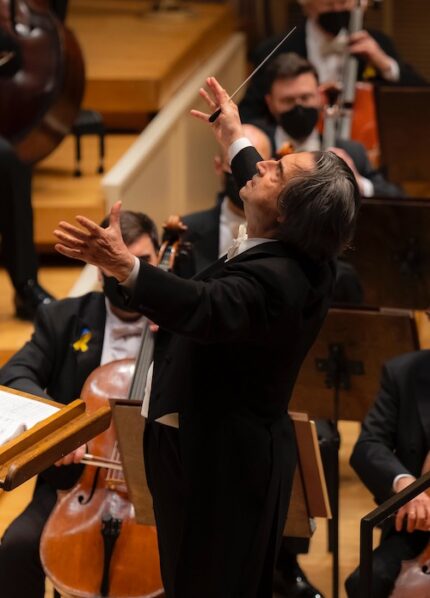
The early PR promotion of Muti as a selfless humanist and philosopher-musician clanged dissonantly with his imperious and often patronizing behavior with CSO staff and admin. Despite his early, heavily publicized trips to prisons and community concerts, Muti made little impact in the troubled, increasingly violent landscape of Chicago beyond the walls of Symphony Center.
The conductor remains a popular figure among the CSO ranks but even that support had begun to wane with many long feeling it’s time to move on. Muti’s essentially going AWOL during the pandemic—leaving the orchestra to deal with the closed hall and economic impact largely on its own—cooled the affection of many players.
Likewise, his press relations began on a high note. Muti can be a charming, witty and engaging presence one-on-one and in private settings.
Yet it became clear early on that when it comes to the media, Muti didn’t want critics—he wanted disciples.
The conductor seemed to expect the fanboy celebrity adulation he routinely receives from the Italian press to be repeated in Chicago. He bristled at negative reviews and criticism of his repetitive programming.
He soon emphasized interviews with national and international outlets, where the coverage tends to be more laudatory and the questions innocuous (and often uninformed).
Locally, Muti prefers controlled meetings where he can hold court, limited to the least critical of writers—individuals with a strange psychological desire to be close to the throne, and/or those who view the role of arts journalists as collaborative partners in a kind of kumbaya cultural chamber of commerce.
Stories of Muti’s personal generosity and kindnesses to CSO musicians are legion. Unfortunately, so are his high-handed ego displays and lording his status over staff and administration—from his public ridicule of CSO president Jeff Alexander to the fast-spinning revolving door of exiting senior staff, many of whom had been at the orchestra for decades. There’s little doubt that there will be a huge collective sigh of relief from CSO offices when Muti finally walks out the door at the end of this month.
__________
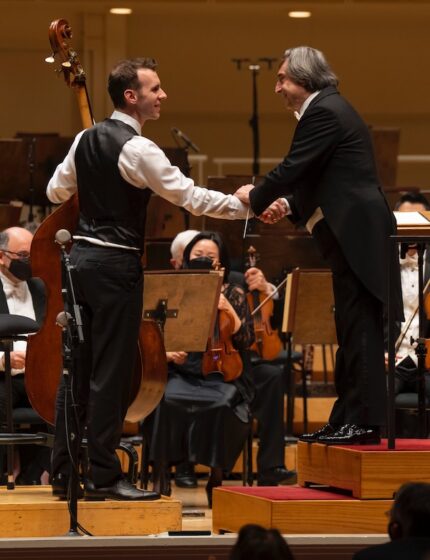
Muti’s greatest and most lasting legacy in Chicago—even more than his performances and recordings—will be the musicians he has hired, nearly all of whom have been outstanding.
There have been lapses. Rehiring former principal oboe Alex Klein—who suffers from a chronic physiological condition—to his old chair verged on madness. And Muti’s deciding vote rejecting David Cooper as principal horn following his trial period continues to rankle musicians and audience members alike—especially after Cooper’s rock-star turn in Mahler’s Ninth Symphony last week.
(Muti will have zero say in personnel matters after this month. If Cooper doesn’t go to Los Angeles, as is rumored, it is not impossible that a way may yet be found for the popular player to remain in his position.)
But the conductor’s successful hires have far outnumbered his mistakes, especially in crucial principal chairs. Clarinetist Stephen Williamson, oboist William Welter, flutist Stefán Ragnar Höskuldsson, bassoonist Keith Buncke, timpanist David Herbert, double-bass Alexander Hanna, and trumpet Esteban Batallán have all been terrific additions to the CSO roster, world-class musicians who have helped to make every concert a richer experience.
So, Addio, senza rancor to the mercurial Italian maestro.
With eight of Muti’s ten weeks freed up, the 2023-24 lineup provides the most varied and wide-ranging CSO programming in over a decade.
The music director job remains open and this will prove to be a fascinating CSO season for Chicago audiences. With an array of superb guest conductors, nearly every week will bring a potential Riccardo Muti successor to the Orchestra Hall podium.
Riccardo Muti conducts the CSO June 15-17 in Schubert’s Symphony No. 9, Johann Strauss’s Overture to Indigo and the Forty Thieves, and Lalo Schifrin’s Tuba Concerto with soloist Gene Pokorny.
In his final program as music director, Muti conducts Beethoven’s Missa solemnis June 23-25. cso.org
